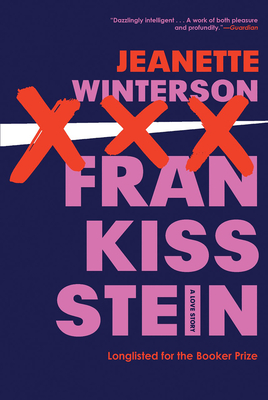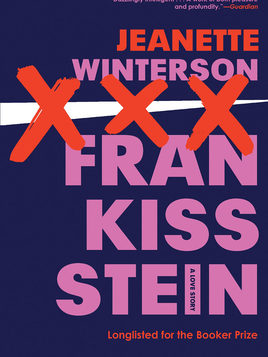 Frankissstein: A Love Story
Frankissstein: A Love Story
by Jeanette Winterson
Grove Press. 352 pages, $27.
JEANETTE WINTERSON’S latest novel raises two basic questions: What does it mean to be human? And what are the limits of reaching for immortality? Frankissstein: A Love Story explores these and related issues that have preoccupied thinkers and scientists in recent centuries. The novel depicts reactions to social disruption and comes out at a time of growing fear over climate change, just as Mary Shelley’s Frankenstein emerged in 1816, the terrifying “year without a summer” following the eruption of the Mount Tambora volcano in Indonesia. Flippant as the title sounds, Frankissstein probes some serious matters.
Winterson is professor of creative writing at the University of Manchester, where she succeeded Colm Tóibín in that post. Author of the classic lesbian coming out novel Oranges Are Not the Only Fruit (1985), she has been named a CBE, Commander of the Most Excellent Order of the British Empire. Frankissstein is her homage to a British icon, Shelley’s Frankenstein. Both novels look at the consequences of attempting to create human life artificially.
Shelley’s Frankenstein involves an account that a sea captain in St. Petersburg heard from Victor Frankenstein, who had studied chemical processes of decay and claimed to have reanimated salvaged body parts. Filled with remorse when his “demoniacal corpse” began killing people, Frankenstein had pursued the monster to Tartary, a frozen land vaster than present-day Russia, where the sea captain had rescued him and heard his grim tale.
Winterson’s Frankissstein is comprised of two interwoven stories: the first imagines teenage Mary Shelley eloping from London to Geneva with Percy Bysshe Shelley, her married lover. As a backdrop, think of the Industrial Revolution and its contradictions, with British cavalry attacking workers assembled in Manchester to demand parliamentary reform (the “Peterloo Massacre”) while London gentry pay fees to view patients at Bethlem (known as “Bedlam”), a newly renovated 13th-century hospital for the insane.
 The second story is a science-gone-amok thriller that takes place just ahead of the present. Winterson ingeniously populates this story with updated versions of Mary Shelley and her friends when she began writing Frankenstein. Shelley herself becomes a young transgender physician, “Ry” Shelley, the novel’s narrator and a main character. Clearly bright and assertive, Ry is nevertheless subjected to demeaning remarks and a brutal assault because of his sexual identity. Lord Byron resurfaces as Ron Lord, Shelley’s friend and a slick businessman who hypes robots designed to be sex partners known as “sexbots.” Frankenstein turns into Victor Stein, a brilliant theoretician with no emotional intelligence. For context, picture England and the U.S. in the 1940s and ’50s: Bletchley Park, the Turing Test of machine intelligence, atomic power, darpa, and a waxing cybernetic strum on both sides of the Atlantic.
The second story is a science-gone-amok thriller that takes place just ahead of the present. Winterson ingeniously populates this story with updated versions of Mary Shelley and her friends when she began writing Frankenstein. Shelley herself becomes a young transgender physician, “Ry” Shelley, the novel’s narrator and a main character. Clearly bright and assertive, Ry is nevertheless subjected to demeaning remarks and a brutal assault because of his sexual identity. Lord Byron resurfaces as Ron Lord, Shelley’s friend and a slick businessman who hypes robots designed to be sex partners known as “sexbots.” Frankenstein turns into Victor Stein, a brilliant theoretician with no emotional intelligence. For context, picture England and the U.S. in the 1940s and ’50s: Bletchley Park, the Turing Test of machine intelligence, atomic power, darpa, and a waxing cybernetic strum on both sides of the Atlantic.
The action zigzags between the two stories, but events appear remarkably interconnected thanks to Winterson’s relevant allusions—for example, to polymath Charles Babbage, who built the first mechanical digital computer, and to mathematician Ada Lovelace, Byron’s daughter (!), who wrote a program for it. The novel is structured like a play, with acts and scenes, and it’s full of fresh, witty language. Its pervasive ribaldry nicely hits such deserving targets as transphobia, evangelicalism, and the preening on display at pop science lectures (think TED Talks). At a Tec-X-Po conference in Memphis, Intelligent Vibrators are on offer, along with “teledildonics” products hawked for “sex play … from separate locations.” Frankissstein oscillates between sci-fi and literary fiction, and it can feel a bit chaotic at times as a reading experience.
Critical reception to the book, which came out last fall, has been positive. Over 200 enthusiasts attended a recent author reading in Cambridge, Massachusetts, and an informal survey found similarly upbeat critical reviews in The Guardian, The L.A. Times, New Scientist, The Washington Post, and Financial Times. An equivocal New York Times review conceded the novel has “an intelligent soul,” while the London tabloid Evening Standard termed it a “weird” tale of “plainly regressed” morality.
What did the favorable critics like about the book? They appreciated the risks that Winterson has taken, including the audacity of the dual narrative structure (“parallel stories of ‘future fear’”). Other pluses were its reinvented characters, its deft humor (“a screw loose in the best possible way”), and a bawdiness (“delightfully obscene”) that exposes the “rank misogyny” of today’s porn industry. They admired how the writer credibly evokes current havoc as well as an A.I. future in which people will live alongside robots even as they wrestle with redefining themselves. One prospect the novel artfully plays out involves cryogenics and the revival of a human brain.
In the end the meaning of being human in this novel comes down to love and its mysteries—as seen, for example, in Ry’s attraction to brainy, egotistic Victor, who is fascinated and perplexed by the physician’s transgender self. In spite of many off-putting signals, Ry feels anguished at the prospect of losing him. Indeed, as Daisy Hay noted in the Financial Times, the whole novel is a kind of “meditation on love and grief.” Frankissstein settles on a wryly positive position, resting not on an alchemist’s fantasy of eternal life or a biotech dream of cells programmed to live forever, but on more ordinary experience. “We are lucky, even the worst of us, “ Ry says, “because daylight comes.”
Rosemary Booth is a writer and photographer living in Cambridge, Massachusetts.






